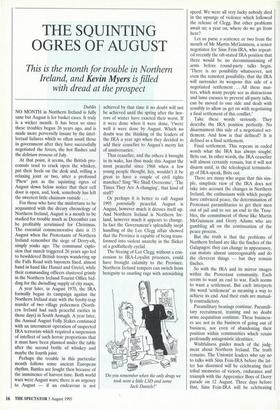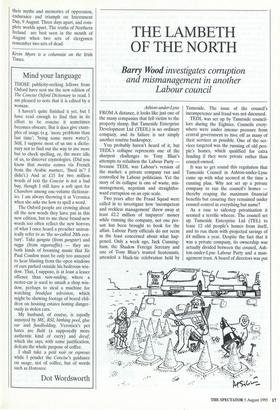THE SQUINTING OGRES OF AUGUST
This is the month for trouble in Northern
Ireland, and Kevin Myers is filled
with dread at the prospect
Dublin NO MONTH in Northern Ireland is fully sane but August is for basket cases. It truly is a wicker month. It has been so since these troubles began 26 years ago, and is made more perversely insane by the intel- lectual failures which so often assail those in government after they have successfully negotiated the fevers, the hot flushes and the delirium tremens of July.
At that point, it seems, the British pro- consuls tend to crack open the whiskey, put their heels on the desk and, rolling a relaxing joint or two, utter a profound 'Phew' just as the squinting ogres of August down below notice that their cell door is open, and, look, somebody has left the sweetest little chainsaw outside. . .
For those who have the misfortune to be acquainted with the dreary chronology of Northern Ireland, August is a month to be studied for trouble much as December can be profitably scrutinised for Christmas. The essential commemorative date is 15 August when the Protestants of Northern Ireland remember the siege of Derry-oh, simply yonlcs ago. The communal explo- sion that march triggered 26 years ago led to bewildered British troops wandering up the Falls Road with bayonets fixed, almost hand in hand like Hansel and Gretel, while their commanding officers clustered grimly in the Northern Ireland Tourist Office bid- ding for the dwindling supply of city maps.
A year later, in August 1970, the IRA formally began its campaign against the Northern Ireland state with the booby-trap murder of two village policemen (North- ern Ireland had such peaceful exotics in those days) in South Armagh. A year later, the Annual August Folly Stakes continued with an internment operation of suspected IRA terrorists which required a suspension of intellect of such heroic proportions that it must have been planned under the table after the second bottle of whiskey and maybe the fourth joint.
Perhaps the trouble in this particular month follows some ancient European rhythm. Battles are fought then because of the imminence of harvest time. Both world wars were August wars; there is an urgency to August -- if an endeavour is not achieved by that time it no doubt will not be achieved until the spring after the hor- rors of winter have exacted their worst. If it were done when it were done, 't'were well it were done by August. Which no doubt was the thinking of the leaders of the IRA a year ago when they decided to add their ceasefire to August's merry list of anniversaries.
That ceasefire, and the others it brought in its wake, has thus made this August the most peaceful since 1968 when a few young people thought, hey, wouldn't it be great to have a couple of civil rights marches? Sing 'We Shall Overcome', 'The Times They Are A-changing', that kind of stuff?
Or perhaps it is better to call August 1995 potentially peaceful. August is August, however much it dresses itself up. And Northern Ireland is Northern Ire- land, however much it appears to change. In fact the Government's splendidly inept handling of the Lee Clegg affair showed that the Province is capable of being trans- formed into violent anarchy in the flicker of a godfatherly eyelid.
The freeing of Lee Clegg, without a con- cession to IRA-Loyalist prisoners, could have brought calamity to the Province. Northern Ireland tempers can switch from benignity to snarling rage with astonishing 'Do you remember when the only drugs we took were a little LSD and some Jack Daniels?' speed. We were all very lucky nobody died in the upsurge of violence which followed the release of Clegg. But other problems await us; a year on, where do we go from here?
Let us parse a sentence or two from the mouth of Mr Martin McGuinness, a senior negotiator for Sinn Fein-IRA, who repeat- ed recently the oft-stated IRA position that there would be no decommissioning of arms before round-party talks begin.
'There is no possibility• whatsoever, not even the remotest possibility, that the IRA will surrender its weapons this side of a negotiated settlement. . . All these mat- ters, which many people see as distractions and lame excuses to prevent all-party talks, can be moved to one side and dealt with sensibly to allow us get on with negotiating a final settlement of this conflict.'
Take these words seriously. They describe the IRA position perfectly. No disarmament this side of a negotiated set- tlement. And how is that defined? It is defined as a final settlement.
Final settlement. This repeats in coded words what the IRA has always sought: Brits out. In other words, the IRA ceasefire will almost certainly remain, but it will not disarm until, in the teleological terminolo- gy of IRA-speak, Brits out.
There are many who argue that this sim- ple, simplistic view of the IRA does not take into account the changes in Northern Ireland, the enthusiasm with which people have embraced peace, the determination of Protestant paramilitaries to get their men out of jail and to see an end to the Trou- bles, the commitment of those like Martin McGuinness and Gerry Adams who are gambling all on the continuation of the peace process.
But the truth is that the problems of Northern Ireland are like the finches of the Galapagos: they can change in appearance, can mutate almost unrecognisably and do the cleverest things — but they remain finches.
So with the IRA and its mirror images within the Protestant community. Each seems to want an end to war. Each seems to want a settlement. But each interprets the word 'settlement' as meaning a way to achieve its end. And their ends are mutual- ly contradictory.
Paramilitary beatings continue. Paramili- tary recruitment, training and no doubt arms acquisition continue. These business- es are not in the business of going out of business, nor even of abandoning their position within communities which retain profoundly antagonistic identities.
Wishfulness guides much of the judg- ment about Northern Ireland. The truth remains. The Unionist leaders who say no to talks with Sinn Fein-IRA before the lat- ter has disarmed will be celebrating their tribal memories of victory, endurance and triumph with the Apprentice Boys of Derry parade on 12 August. Three days before that, Sinn Fein-IRA will be celebrating their myths and memories of oppression, endurance and triumph on Internment Day, 9 August. Three days apart, and com- plete worlds apart. The truths of Northern Ireland are best seen in the month of August when two sets of clergymen remember two sets of dead.
Kevin Myers is a columnist on the Irish Times.



















































 Previous page
Previous page